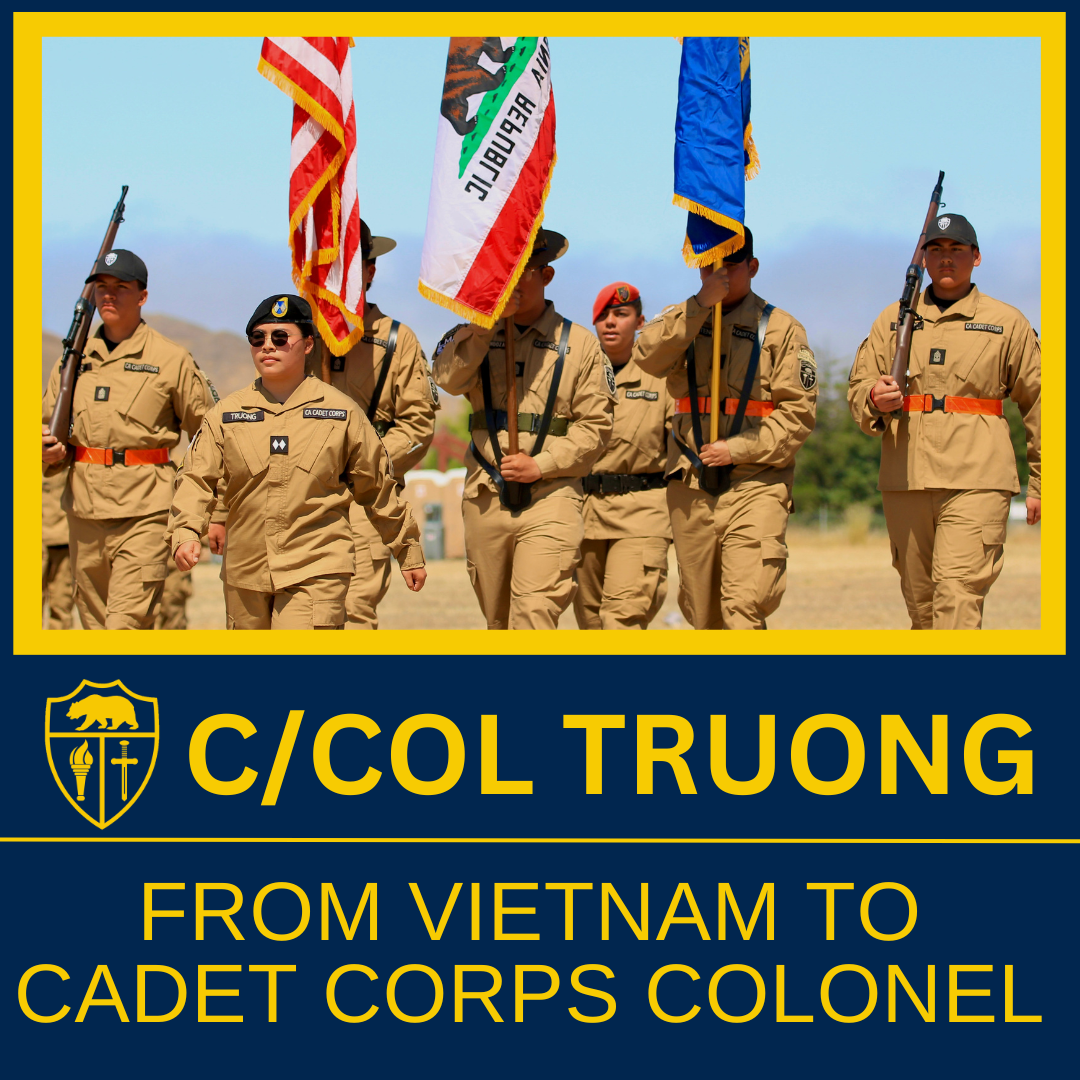
by CACC Capt. James Colbert
June 24, 2023
CAMP SAN LUIS OBISPO, Calif. — Just eight years ago, Dieu Truong was a nine-year-old girl living with her family in Central Vietnam. Today, she is the highest-ranking cadet officer in the California Cadet Corps. How did she do it? What impact did being a cadet have on her? To answer these questions and more, Cadet Colonel Truong sat for an interview during the 2023 Summer Encampment at Camp San Luis Obispo.
Q: How has your time in the Cadet Corps changed you? Do you feel it has prepared you for the future?
A: My time in the Cadet Corps has been a transformative journey that has instilled in me a strong sense of discipline, camaraderie, and leadership. The Corps has provided a structured environment where I could challenge myself physically, mentally, and emotionally. It has taught me the importance of teamwork, perseverance, and resilience. These traits will guide me throughout my life.
Q: Describe your responsibilities as the Cadet Corps Executive Officer.
A: My primary responsibility is to assist the Commanding Officer (CO) by providing support and carrying out their directives. I work closely with the CO to ensure effective leadership and management of the unit. Further, I am responsible for overseeing the 10th Corps staff to coordinate training activities by developing operational plans and ensuring that the unit is prepared to execute its mission. I make sure that communication, coordination, and cooperation with external staff are facilitated to achieve mission objectives.
Q: How has your time in the CACC affected you?
A: I experienced remarkable personal growth throughout my years in the CACC. At first, I was a timid cadet, unsure of my abilities, but over time, I developed confidence in my skills and capabilities. The Cadet Corps has pushed me outside my comfort zone, encouraging me to take on leadership roles and responsibilities. These experiences have helped me build my self-esteem, enhance my decision-making abilities, and sharpen my problem-solving skills. The CACC also fostered a strong work ethic in me, teaching me the value of commitment and dedication to a cause greater than myself. Today, I wear the rank of a Cadet Colonel. I feel like I achieved the impossible.
Q: Why is that?
A: When I first came to the United States and started elementary school, I was diagnosed with a rare neurological disorder called anti-NMDA Receptor Encephalitis. Fortunately, this condition is treatable, but the opportunity for me to receive treatment here was a blessing in disguise, considering how new our life in this country was. Since then, I have wanted to grow up and help others in need. Attending Oakland Military Institute and pursuing leadership in the CACC helped me realize that I want to work to uplift at-risk and underprivileged young people.
Q: How have your years in the California Cadet Corps prepared you for the future?
A: Firstly, the Corps has provided me with a solid foundation of leadership skills. Through various training exercises, I have learned to lead a team, delegate tasks effectively, and make critical decisions under pressure. The rigorous training schedules and academic commitments required meticulous planning and organization. These skills have translated into my academic and professional life, enabling me to manage my time efficiently, meet deadlines, and maintain a structured approach to my responsibilities. These skills will undoubtedly serve me well in my future career and any leadership positions I may hold.
Q: Has the California Cadet Corps changed you as a person?
A: My time as a cadet has instilled in me a deep sense of duty and service. The Cadet Corps’ emphasis on community service and giving back to society has cultivated a strong desire within me to contribute positively to my community. I believe this sense of civic responsibility will guide me in making meaningful contributions to society in my future endeavors.
Q: For an entire year, you planned and led the execution of the Summer Encampment, the biggest training event on the California Cadet Corps calendar. Tell us about that.
A: The execution of the Summer Encampment required extensive prior planning and preparation by the 10th Corps Commandants and the full-time staff. We met in person monthly and communicated frequently via remote platforms.
We were extremely conscious of mitigating risk. In most events, even a small impact can lead to a domino effect of bigger impacts. Therefore, in this Encampment, I considered the risks involved in every movement we make and developed contingency plans to mitigate those risks. Most importantly, I mentored my staff to develop their own plans in a way that allows them to showcase their thought process to all levels of leadership. Mistakes will be made, but they should not serve to discourage us. Instead, we should view them as opportunities to learn and consider the bigger picture.
Q: Now that you are a high school graduate, what are your plans?
A: I will take a gap year before entering university spending three months in Thailand as part of a volunteering opportunity teaching English at a Buddhist School for at-risk girls. Before I depart, I will be reapplying for scholarships that can support me on my educational journey to become a social worker.